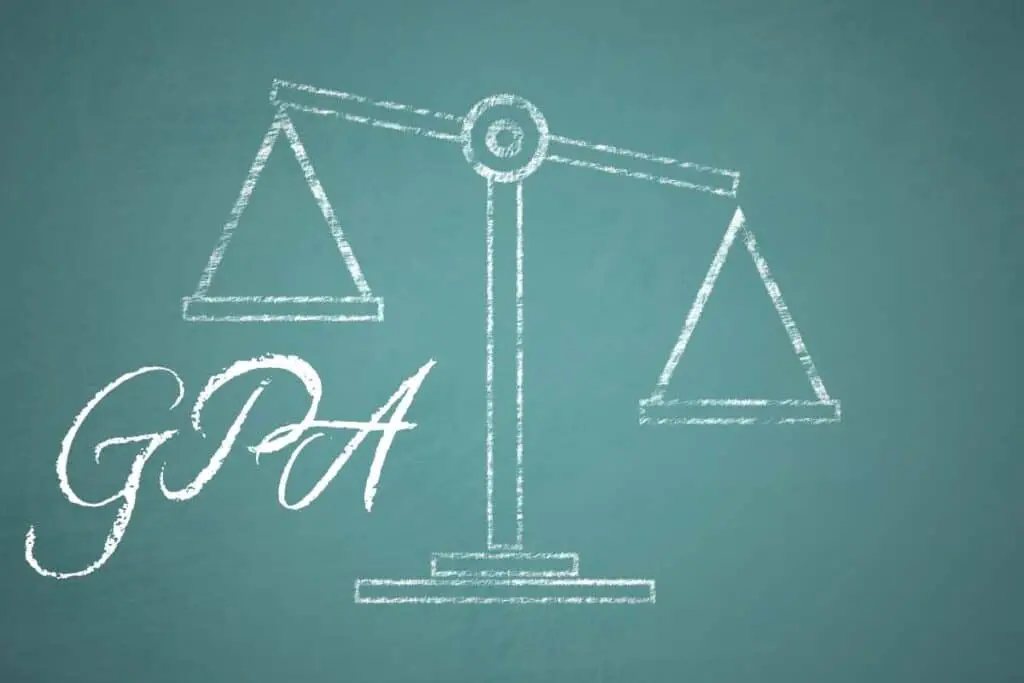Unweighted vs. Weighted GPA Explained
GPA is an important part of high school, especially if you will apply for colleges or apply for jobs after graduation. There are two types of GPAs that schools use: weighted and unweighted. But what is the difference between unweighted and weighted GPAs?
A weighted GPA considers the difficulty levels of your classes, whereas an unweighted GPA does not. Unweighted GPA is the standard 4.0 scale that is most commonly used and discussed. But, weighted GPA is graded on a 5.0 or 6.0 scale where advanced level classes give you more points towards your GPA.
This article will explain what unweighted and weighted GPAs are, why colleges focus on unweighted GPA, and why they still consider weighted GPA. I will also discuss a good weighted and unweighted GPA and whether a weighted GPA matters, as well as resources you can use to learn more about preparing for college.

What Is Unweighted GPA?
Unweighted GPA is the standard GPA that all colleges and high schools use to determine how well a student is doing academically. The maximum, perfect unweighted GPA is a 4.0, and a completely failing GPA would be 0.0.
In the most basic terms, the breakdown would look like this:
- An A-average would be a GPA of 4.0
- A B-average would be a GPA of 3.0
- A C-average would be a GPA of 2.0
- A D-average would be a GPA of 1.0
- Failing would be anything less than a 1.0
See Passing Grades in College: Understanding the Impact of a D
But, you also get points, or lose points, for pluses and minuses. For example, a B+ is worth more than a B, and a B- is less than both. So, not all GPAs will round perfectly to end in 0. Most schools will round GPAs to one or two decimal places.
Here is the grading scale for unweighted GPA (source):
| Letter Grade | GPA Points | Percentage out of 100 |
| A+ | 4.0 | 97-100 |
| A | 4.0 | 94-96 |
| A- | 3.7 | 90-93 |
| B+ | 3.3 | 87-89 |
| B | 3.0 | 84-86 |
| B- | 2.7 | 80-83 |
| C+ | 2.3 | 77-79 |
| C | 2.0 | 74-76 |
| C- | 1.7 | 70-73 |
| D+ | 1.3 | 67-69 |
| D | 1.0 | 64-66 |
| D- | 0.7 | 60-63 |
| F | 0.0 | 0-59 |
All schools use this scale, so if you compare your GPA to a college’s requirements or need to analyze your GPA for any other reason, you know that your GPA is scaled the same way as all the others.
What Is a Weighted GPA?
A weighted GPA, on the other hand, considers the difficulty of your courses. So, college-level classes like AP (Advanced Placement) classes and honors level courses will give you more points towards your GPA.
Unlike unweighted GPAs, weighted GPAs vary by high school.
For example, an A in an AP class might be worth 6.0, an A in an honors class worth 5.0, and an A in a regular class worth 4.0. But, this is not the only scale that schools use.
There are a few common scales that high schools use.
Here is the 5.0 scale:
| Letter Grade | Honors Level GPA Points | College Level GPA Points |
| A | 4.5 | 5.0 |
| B | 3.5 | 4.0 |
| C | 2.5 | 3.0 |
| D | 1.5 | 2.0 |
| F | 0.5 | 1.0 |
Here is the 6.0 scale:
| Letter Grade | Honors Level GPA Points | College Level GPA Points |
| A | 5.0 | 6.0 |
| B | 4.0 | 5.0 |
| C | 3.0 | 4.0 |
| D | 2.0 | 3.0 |
| F | 1.0 | 2.0 |
If you aren’t sure what scale your high school uses, or if your school even has a weighted GPA system, you can ask your counselor or a teacher about it.
And, if you are not in any advanced level classes, you do not have to worry about weighted GPA because your weighted GPA will be the same as your unweighted GPA.
Even though a weighted GPA considers the difficulty level of your classes, you will not be penalized for not taking higher-level classes. A weighted GPA is meant to benefit students taking harder classes without affecting students in standard-level classes.
Why Do Colleges Focus on Unweighted GPAs?
Colleges will almost always look at your unweighted GPA first.
The biggest reason that colleges focus on unweighted GPAs is that high schools universally use them. A huge majority of high schools grade their students on the traditional 4.0 scale.
When colleges look at applications from potential students, one of the most important elements they consider is GPA. If they are looking at weighted GPA, they know that a 5.0 is probably good and a 2.0 isn’t great, but they do not know the exact scale each high school uses.
As mentioned above, high schools use different scales when grading their students on a weighted scale. For example, say two students have weighted GPAs of 5.0. But, one student was graded on a 5-point scale, and the other was graded on a 6-point scale. Therefore, one student would have a perfect GPA, and the other would have a B-average.
However, the college will not know the difference in the grading scales, so they would have to assume that the two students have the same GPA when looking at their applications.
The uncertainty with weighted GPA scales is why colleges primarily focus on unweighted GPA when looking at entry applications.
Do Colleges Look at Weighted GPA?
Just because colleges primarily look at unweighted GPA does not mean that they will not look at weighted GPA.
After they look at your unweighted GPA, some colleges will then consider your weighted GPA. Colleges will look at your weighted GPA because they understand that a B in a college-level class is a great grade.
As we discussed above, weighted GPAs are important because they consider how difficult your classes are. Since certain classes are harder than others, getting a good grade in those classes is impressive.
And, colleges appreciate that you tried a harder class, like an AP or honors class, even if, for example, you got a B instead of an A. They know that a harder class takes more effort, and they will recognize that when they look at your weighted GPA compared to your unweighted GPA and your transcript.
Furthermore, higher weighted GPA signals to them that you are prepared to take on more difficult courses at the college level because you performed well in your higher-level classes in high school.
In the next section, we will explain what colleges consider a good weighted GPA.
What Is a Good Weighted GPA?
In general, a good weighted GPA is anything over a 4.0. A GPA higher than 4.0 means that you took harder classes and passed them with at least a C+ average.
A perfect weighted GPA is usually a 5.0 or 6.0, depending on your school’s scale to calculate it. But, a perfect GPA is usually impossible to obtain because the likelihood of you taking exclusively advanced classes throughout high school is low.
There are two reasons that this is difficult. First, most classes offered to first-year students in high schools are not advanced-level classes, meaning you can’t get advanced (weighted) credit during your freshman year.
Secondly, advanced level classes are not offered for every subject. Many electives are considered standard-level classes and are graded on the 4.0 unweighted GPA scale.
For example, an advanced-level graphic design class may not be considered college-level. And, even if your school does offer an advanced level, you likely need to take a basic level graphic design class before you can take the advanced level.
Here is a great video from CollegeMapper on YouTube that will explain to you how to calculate your weighted GPA:
What Is a Good Unweighted GPA?
A perfect unweighted GPA is a 4.0. You will earn a 4.0 if you get A’s in every one of your classes, regardless of how easy or difficult they are.
Typically, anything over a 2.0, which is a C average, is a passing GPA which signals that you are doing well enough in all of your classes.
A good unweighted GPA is anything over a 3.0, which is a B average. But, you do not necessarily have to get B’s in every class to have a 3.0 GPA. A’s will balance out C’s to give you a 3.0, as long as you keep the balance in check.
Say you take two classes, for example, and have an A in one class and a C in another. You will have a GPA of 3.0, which is considered good even though you have a C in one class.
GPA is an average, so your lower grades will be offset by the higher ones and vice versa. If you do not have a good grade in one class, you do not need to worry. You will not end up with a perfect GPA, but no one is perfect, and you will still be fine.
If you need to calculate your GPA, you can learn with this video from Howcast on YouTube:
Does Weighted GPA Really Matter?
The weighted GPA matters more for students taking advanced courses or trying to get into an elite college. A good weighted GPA, as discussed above, illustrates to colleges that you worked hard to succeed in your most difficult classes.
However, if you are a student that does not take higher-level courses and are only enrolled in the standard courses, both of your GPAs will be the same.
You also do not need to worry about weighted GPA if your school does not grade students on a weighted scale. Often, this happens with schools that do not offer advanced courses.
Furthermore, you need to remember that GPA, weighted and unweighted, are not the only things that colleges look at when determining who to accept. Other important factors include (source):
- Your essay
- Extracurricular activities like sports, clubs, and volunteer activities
- Demonstration of leadership
- Standardized test scores
- Transcript with course-specific grades and difficulty levels
See Does Your College GPA Really Matter?
Learn More About GPA and College Applications
Applying to college can be stressful, especially if you are confused about how GPA works and the difference between weighted and unweighted GPA. Here are some resources that will help you prepare for college and how to successfully apply to college.
First, this video from Best College Aid will explain further what the difference between weighted and unweighted GPA is if you want to understand it more:
Next, this video from MsVictoriaShantrell explains how important GPA is for getting into college and how they consider weighted vs. unweighted GPA:
The book Future Ivy: Your Guide to College Applications (link to Amazon) will explain how to master the most important steps of college admissions. You will learn how to complete the perfect application, including extracurricular activities, essays, and making up for a weak GPA or test scores. You will also have access to bonus videos about scholarships, the common application, and the best extracurriculars.
Finally, The Truth about College Admission Workbook (link to Amazon) will help you organize your college search.
You will learn how to choose schools to visit and apply to, how to write your essays and complete your interviews, and how to efficiently and completely apply for college. There are interactive exercises that will teach you what questions to ask, factors to consider, and crucial information you need to know to find and get into the best college for you.
Final Thoughts
A weighted GPA considers the difficulty of your classes and will give you more points for getting higher grades in harder courses. Unweighted GPA gives all classes the same weight, so an A in a harder class is worth the same as an A in your introductory classes.
If you are not in any advanced level classes, you do not have to worry about your weighted GPA, as it will be the same as your unweighted. But, if you are in harder classes, your weighted GPA will reflect your effort in taking those classes.
Recommended Reading:






